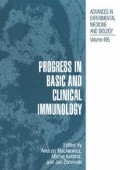Abstract
Heat shock proteins (Hs;ps) are a family of proteins that are constitutively expressed by eukaryotic cells. They act as molecular chaperones, participating in intracellular translocation of proteins and enabling proper folding of polypeptide chains. It is postulated that unique chaperoning properties of Hsps might contribute to generating specific immune responses against peptides bound to theme’2. Many studies have demonstrated that Hsps isolated from cancer or viral infected cells elicit antitumor or antiviral immune response. However, Hsps derived from normal cells did not shown such effect3’4.It has been suggested that peptides associated with Hsps are responsible for this specific immunogenecity5.
Access this chapter
Tax calculation will be finalised at checkout
Purchases are for personal use only
Preview
Unable to display preview. Download preview PDF.
References
Srivastava, P.K., 1993, Peptide-biding heat shock proteins in the endoplasmic reticulum: role in immune response to cancer and in antigen presentation. Adv. Cancer Res. 62: 153–177.
Srivastava, P.K., Meoret, A., Basu, S., Binder, R.J., McQuade, K.L., 1998, Heat shock proteins come of age: primitive function acquire new roles in an adaptive world. Immunity. 8: 657–665.
Udono, H., and Srivastava, P.K., 1994, Comparison of tumor-specific immunogenicities of stress-induced proteins gp96, Hsp90, and Hsp70, J. Immunol. 152: 5398–5403.
Suto, R., and Srivastava, P.K., 1995, A mechanism for the specific immunogenicity of heat shock protein-chaperoned peptides. Science. 269: 1585–1588.
Li, Z., and Srivastava, P.K., 1993, Tumor rejection antigen gp96/grp94 is an ATPase: implications for protein folding and antigen presentation. EMBO J. 12: 3143–3151.
Peng, P., Menoret, A., Srivastava, P.K., 1997, Purification of immunogenic heat shock protein 70-peptide complexes by ADP-affinity chromatography. J. Immunolgical Methods. 204: 13–21.
van Eden, W., van der Zee, R., Paul, A.G.J., Prakken, B.J., Wendling, U., Anderton, S.M., and Wauben, M.H.M., 1998, Do heat shock proteins control the balance of T-cell regulation in inflammatory diseases?. Immunol. Today. 19: 303–307.
Udono, H., and Srivastava P.K., 1993, Heat shock protein 70 — associated peptides elicit specific cancer immunity. J. Exp. Med. 178: 1391–1396. Methods. 204: 13–21.
Author information
Authors and Affiliations
Editor information
Editors and Affiliations
Rights and permissions
Copyright information
© 2001 Springer Science+Business Media New York
About this chapter
Cite this chapter
Galazka, G., Walczak, A., Berkowicz, T., Selmaj, K. (2001). Effect of Hsp70-peptide complexes generated in vivo on modulation EAE. In: Mackiewicz, A., Kurpisz, M., Żeromski, J. (eds) Progress in Basic and Clinical Immunology. Advances in Experimental Medicine and Biology, vol 495. Springer, Boston, MA. https://doi.org/10.1007/978-1-4615-0685-0_31
Download citation
DOI: https://doi.org/10.1007/978-1-4615-0685-0_31
Publisher Name: Springer, Boston, MA
Print ISBN: 978-1-4613-5194-8
Online ISBN: 978-1-4615-0685-0
eBook Packages: Springer Book Archive

